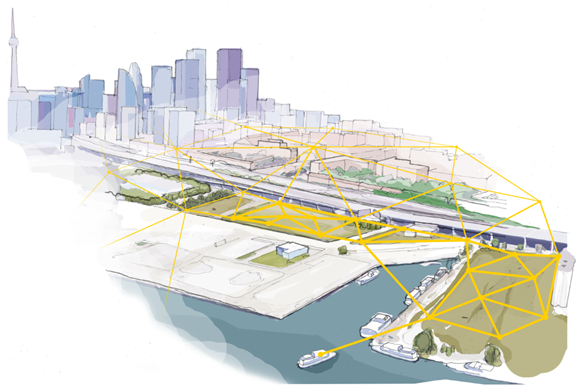Google & Canada Conspire on City of the Future
A California internet company wants to build the future of cities. And it will start with 12 acres of brownfield in Canada.
Sidewalk Labs, the “smart city” division of Alphabet (GOOGL), and the city of Toronto want to bring self-driving cars, smart infrastructure and even drone package delivery to a windswept strip of abandoned industrial land.
It’s ambitious. It’s also a huge opportunity for investors.
Smart cities are not a new concept. Architects and futurists have been toying with the idea for decades. In theory, starting from scratch, these should allow urban planners the latitude to build more-efficient civic systems.
This should finally bring to life the future promised by utopian science fiction.
In Singapore, smart city development is part of its DNA. In 1965, Prime Minister Lee Kuan Yew raised the prospect of transforming that area from mudflats to a metropolis. The goal was to take the island city-state from the third to the first world in one generation.
This idea was born out of necessity. Singapore had no resources.
Years later, the government worked with the private sector to build massive desalination plants and reclaim land from the sea. Technology that did not exist when they started. So, it had to be developed.
Today, Singapore is designing a connected city with all the autonomous conveniences of the future. This “Smart Nation” project aims to bring technology to all aspects of its citizens’ lives. It includes systems to help people summon transportation, report environmental issues, access public services on demand, enjoy a cashless society and more.
And now, we’ll soon see another city with a brand-new, and more-digital, identity …
Initially, Sidewalk will invest $50 million in Quayside, a new Toronto waterfront community. Over the course of a year, it will meet with planners and developers to determine the best path forward.
The plan is to build at least 3.3 million square feet of office, commercial and residential space. That includes a new headquarters for Google Canada.

This is a rendering of Sidewalk Labs’ digital infrastructure vision for Quayside. Canada has made a nearly $1 million investment, and Sidewalk has committed $50 million to phase-one development. Their goal: “environmental sustainability, affordability, mobility and economic opportunity.”
The cornerstone of the development is data. Alphabet has become a machine-learning company. From its dominant Search franchise, to its Verily bioscience unit, to Waymo — its autonomous vehicle company — artificial intelligence and the use of Big Data analytics is integral.
Quayside will take data to the next level …
The goal is to use data analytics to improve air quality, traffic, the electrical grid and even trash collection.
Some of the ideas under consideration include modular high-density buildings that could be constructed offsite. Public roads that would be off limits to private vehicles. In Sidewalk’s vision, public space makes room for only autonomous taxibots and buses, package-delivering aerial drones, pedestrians and green space.
Quayside is expected to be a whirlwind of technological innovation.
- On the first level, autonomous maintenance vehicles will buzz about — collecting and removing trash, and moving freight.
- A level below, a vast commercial space is planned, a climate controlled retreat from the cold Canadian winters.
- Another level lower would feature rapid transit systems.
The opportunity for investors is that most of these technologies are in the early stage of development.
In this New Gilded Era of innovation, information technology is progressing so fast, almost anything that can be imagined can become possible. What amounts to a giant test bed for new ideas and processes will only speed development.
Autonomous vehicles, once the stuff of science fiction, are already being tested all over the world. This week, Delphi (DLPH) announced it would buy nuTonomy for $450 million. The Boston-based maker of autonomous vehicle software cut its teeth with taxibots in Singapore. That makes Delphi a stock to watch in coming months and years.
And there is opportunity for makers of sensors, CAD software developers, materials design, 5G network companies and countless other businesses.
Artificial intelligence will also play a role. And Google has that covered, too.
This is a gigantic opportunity investors should seize now.
Best wishes,
Jon Markman
P.S. As smart cities, and the futuristic technology they will contain, come to life, investors will see massive profit opportunities. Alphabet won’t be alone in turning yesterday’s science-fiction dreams into tomorrow’s realities. It’s going to be buying a lot of parts and services … and maybe even the companies themselves! That’s a trend none of us can afford to miss out on. The time to invest in all things “smart” is now … and clicking this link is the smartest way I can think of to start doing just that.



